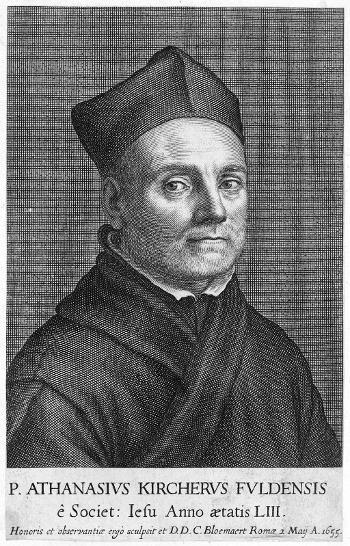
Athanasius Kircher, by Cornelis Bloemaert. 1665. Copper engraving, 33.2 by 21.9cm. (Germanisches Nationalmuseum, Nuremberg; source of image: Wikimedia Commons)
In an addendum to the August post on the Monumenta Kircheri project at the Historical Archives of the Pontifical Gregorian University, we are delighted to announce this week the release in EMLO of the transcriptions and translations into English of twenty-eight letters sent from Gottfried Alois Kinner von Löwenthurn (born c. 1610) to Athanasius Kircher (1601–1680). These texts have been created and prepared for publication by Thomas E. Conlon (contributor to EMLO of the Caspar Schott (1608–1666) catalogue) and Philip Neal. Thomas Conlon and Philip Neal, together with Professor Dr Hans-Joachim Vollrath of the Institut für Mathematik at the Julius-Maximilians-Universität Würzburg, have also kindly shared their invaluable transcriptions with the Kircher project in Rome.
EMLO too is delighted to be collaborating with Monumenta Kircheri by supplying the metadata for Kircher’s letters currently on display in the union catalogue. Kircher’s correspondence has been pieced together over the years by a number of key scholars and projects, and users of EMLO may find interesting the account on the catalogue’s introductory page of the manner in which this inventory has come into being and how it has continued to evolve.
Gottfried Aloys Kinner von Löwenthurn was born in about 1610 in Reichenbach, Silesia (now Dzierżoniów, in south-west Poland). A doctor of theology, philosophy, and law, he was invited by the Holy Roman Emperor to oversee the education of the young Archduke Karl Joseph (1649–1664) and, in a letter of 11 October 1664, the tutor is found pouring out his grief to Kircher following the death of his young charge. Kinner’s surviving letters to Kircher, which span the years from 1652 until 1669, chart Kinner’s side of the friendship. Over nearly two decades, comets, experiments, geometry, alchemy, and England’s Royal Society are discussed. So too is sickness and old age — including the sad condition of Marcus Marci (Jan Marek Marci, 1595–1667) who, Kinner informs Kircher, ‘despite being forgetful of almost everything, still however remembers your name’. Kinner includes an account of the solar eclipse of 12 August 1654. The effect of Kircher’s work on the Republic of Letters is considered, and a hideous operation performed by an unnamed Englishman on the eye of a goose is described in graphic detail. Kinner is an engaging correspondent. His letters are rich in detail and (bar the incident with the goose) a joy to read.
